Climate changes and the carbon footprint... October victories are new lectures at the Faculty of Graduate Studies for Childhood
Under the auspices of Prof. Dr. Mahmoud El-Meteini, President of Ain Shams University, and Prof. Dr. Howaida El-Gebali, Dean of the Faculty of Graduate Studies for Childhood, the Faculty organized an awareness lecture on climate change and the carbon footprint, the university’s efforts to transform into a green university and the new October victories with the participation of the Department of Media and Children’s Culture, within the framework of the role Developmental and Awareness for the Faculty of Graduate studies for Childhood.
Prof. Dr. Zakaria Ibrahim El-Desouky, Head of the Department of Media and Children's Culture, Prof. Dr. Etemad Khalaf Meebed, Professor of Media in the Department of Media and Children's Culture presented the seminar, in the presence of Prof. Dr. Howaida Al Gebali, Dean of the faculty, Prof. Dr. Randa Kamal, Vice Dean for Community Service and Environmental Development, and Prof. Dr. Hoda Gamal, Head of the Department of Psychological Studies for Children.
The symposium was attended by a large number of students and researchers at the college, faculty members, and a number of administrators.
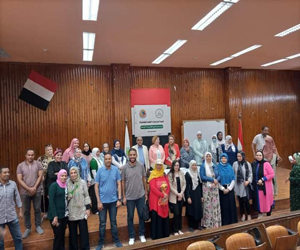 |
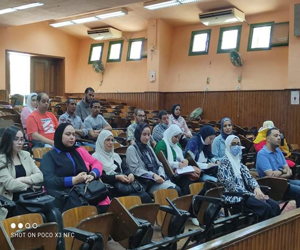 |
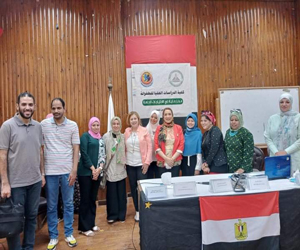 |
||
The symposium began with the speech of Prof. Howaida Al-Jabali, Dean of the College, who welcomed her to the attendees and participants, and stressed that the topic of the symposium comes within the framework of the college and the university’s keenness to raise awareness of climate change and the carbon footprint because of its important effects on the shape of societies, both in Egypt and the world, and in line with The state's various goals and plans.
Al-Gebali explained that the faculty was keen to present this important topic in conjunction with the glorious October victory celebrations, which should be celebrated to demonstrate the Egyptian achievements and heroisms in this valiant war, and to spread knowledge to new generations of the victory of the Egyptian army.
During the events, a minute of silence was observed in respect and honor of all the martyrs of the Egyptian army in the Sixth of October War, and the subsequent sacrifices made by the military institution for the protection and safety of the homeland.
Prof. Dr. Etemad Khalaf Maabad, Professor of Media in the Department of Media and Children's Culture, spoke about the experience of the October victory, and the backgrounds that preceded achieving this victory, after many thought that Egypt would not take the step of war after the setback of 1967 AD, but the people were able to stand again, and re-establish From building its cognitive, emotional and behavioral components anew, and thanks to the skill of the military leadership at the time, from deluding everyone that Egypt will not go to war, to achieve after that a victory that history will immortalize with letters of light.
The media professor at the college explained that the media played a major role in the transformation process from after the setback period to recharging the citizens' concerns again, up to its recording of the October victory, whether with patriotic songs and dramas that still document that period until this time.
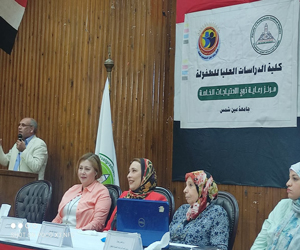 |
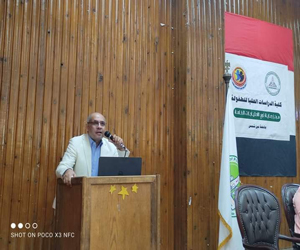 |
Then Prof. Dr. Zakaria Ibrahim El-Desouky, Head of the Department of Media and Children's Culture, spoke about the climate changes that Egypt and the world are witnessing, and what is related to the concept of the carbon footprint, its concept and components, the main causes of which are carbon dioxide and methane emissions.
Prof. Dr. Zakaria El-Desouki, Head of the Media Department, stressed that the state is seeking, through its various plans, to confront climate changes, and limit the spread of severe shifts in the climate that we have started to notice recently, from extreme heat in the summer and freezing cold in the winter, and this matter has spread to countries The world, like Europe, has experienced significant increases in temperatures.
Al-Desouki explained that a number of measures must be taken to combat the carbon footprint, such as reducing carbon dioxide emissions, reducing electrical energy consumption, and reducing the number of driving hours.
.svg)




